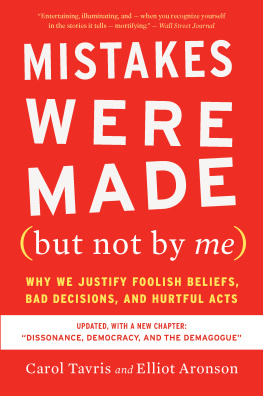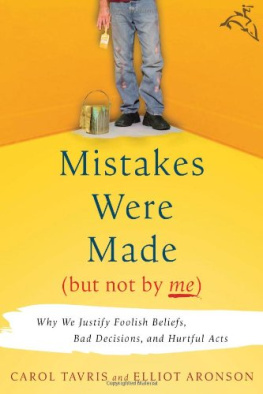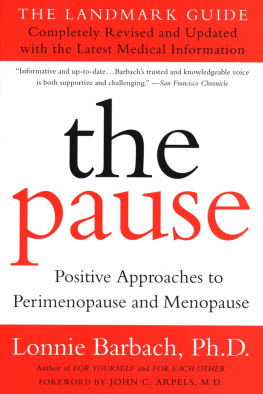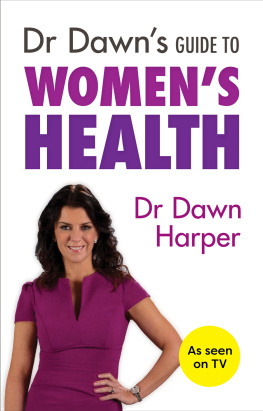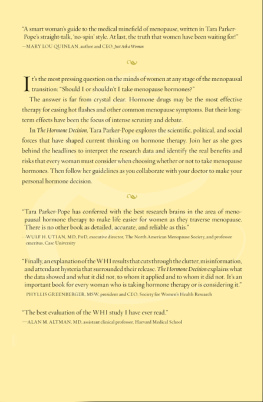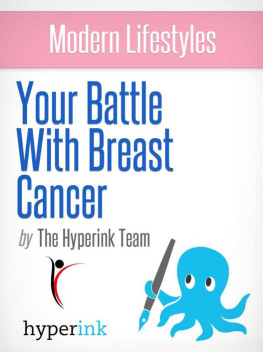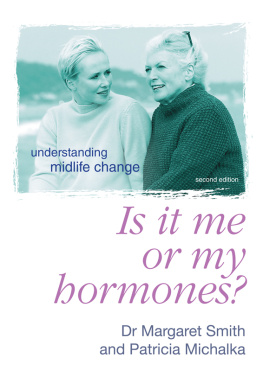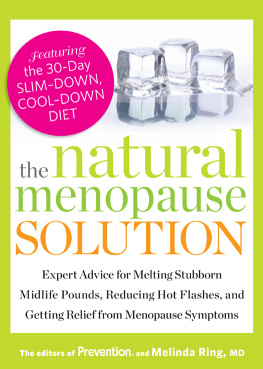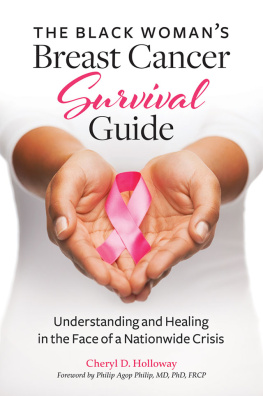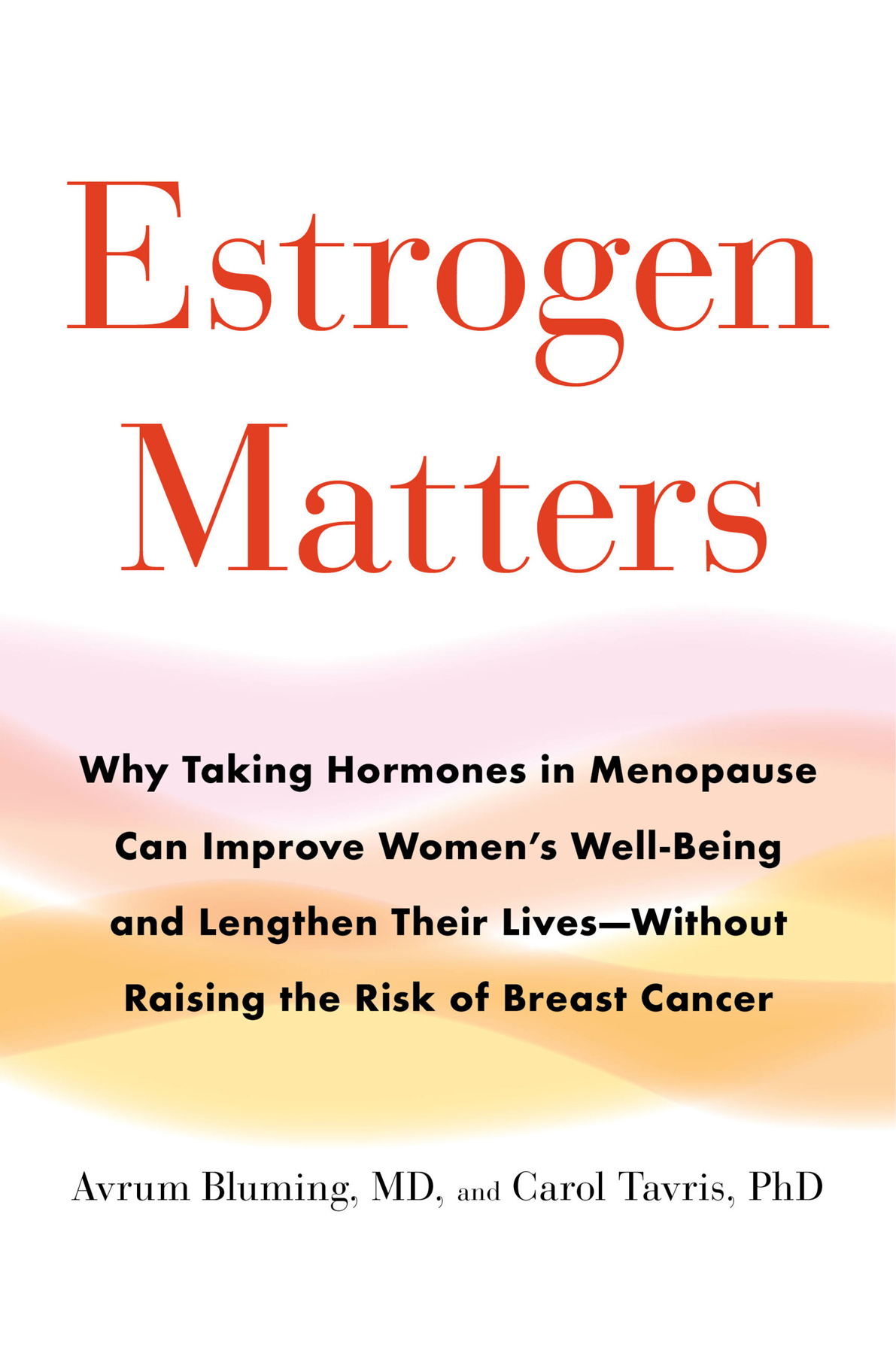Explore book giveaways, sneak peeks, deals, and more.
Tap here to learn more.

Discover Your Next Great Read
Get sneak peeks, book recommendations, and news about your favorite authors.
Tap here to learn more.

This book is intended to provide helpful and informative material, including the opinions and conclusions of the authors with respect to some vitally important yet controversial medical issues. It is not intended to replace the advice of a physician. Always consult your physician or qualified health-care professional on any matters regarding your health and before adopting any suggestions in this book or drawing inferences from it.
The author and publisher specifically disclaim any liability, loss, or risk, personal or otherwise, that is incurred as a consequence, directly or indirectly, of the use and application of any of the contents of this book.
Copyright 2018 by Avrum Bluming, MD, and Carol Tavris, PhD
Afterword 2021 copyright 2021 by Avrum Bluming, MD, and Carol Tavris, PhD
Author photographs by Kathryn Jacobi
Cover design by Lucy Kim
Cover copyright 2018 by Hachette Book Group, Inc.
Hachette Book Group supports the right to free expression and the value of copyright. The purpose of copyright is to encourage writers and artists to produce the creative works that enrich our culture.
The scanning, uploading, and distribution of this book without permission is a theft of the authors intellectual property. If you would like permission to use material from the book (other than for review purposes), please contact permissions@hbgusa.com. Thank you for your support of the authors rights.
Little, Brown Spark
Hachette Book Group
1290 Avenue of the Americas, New York, NY 10104
littlebrown.com
twitter.com/littlebrown
facebook.com/littlebrownandcompany
First ebook edition: September 2018
Little, Brown Spark is an imprint of Little, Brown and Company, a division of Hachette Book Group, Inc. The Little, Brown Spark name and logo are trademarks of Hachette Book Group, Inc.
The Hachette Speakers Bureau provides a wide range of authors for speaking events. To find out more, go to hachettespeakersbureau.com or call (866) 376-6591.
The publisher is not responsible for websites (or their content) that are not owned by the publisher.
ISBN 978-0-316-48118-2
E3-20211215-JV-PC-COR
How could one flawed scientific conclusion become a persuasive juggernaut that changed the practice of womens health worldwide? In their fascinating account, Bluming and Tavris challenge that conclusion and unpack the reasons for its remarkable impact.
Robert B. Cialdini, PhD, author of Influence and Pre-Suasion
This is such an important book, I want to do all I can to encourage every woman to read it. Groundbreaking and carefully researched, Estrogen Matters provides essential information about the many benefits of estrogen at menopause and even after a diagnosis of breast cancer. It reveals the misinterpretation of study results that led women (and their doctors) to have unwarranted concerns about estrogen use. The thoughtful information presented here will help women feel more comfortable taking estrogen, leading to healthier, longer lives for many.
Patricia T. Kelly, PhD, specialist in cancer risk assessment and author of Assessing Your True Risk of Breast Cancer
Given breast cancers substantial morbidity, mortality, emotional toll, and the vast consequences of its treatment, this frontal salvo on the conventional wisdom of estrogen use is refreshing and welcome. The book will stir a lively debate about the merits of decades of existing clinical research on estrogens and help reframe the way clinicians and patients view the trade-off between the benefits and risks of hormone therapy.
Jerome P. Kassirer, MD, distinguished professor, Tufts University School of Medicine, and former editor in chief, New England Journal of Medicine
Having spent over two decades advancing womens health, I was appalled by the Womens Health Initiatives efforts to sensationalize and distort their own findings to promote an anti-hormone-therapy agenda. I hope Estrogen Matters draws enough attention to counter the fears and misinformation about HRT that so many women, and their physicians, still hold.
Phyllis Greenberger, MSW, former president and CEO of the Society for Womens Health Research
This book is long overdue, and I salute the authors for their courage and effort (and their clear, witty writing). I believe it is an ethical imperative for all clinicians who treat women in menopause or women with breast cancer to alert their patients to this book.
Michael Baum, MD, Visiting Professor of Medical Humanities, University College London
Bluming and Tavris tell estrogens story in a way that is both accessible to the general public and appropriate for professionals. This book is an exhaustively researched and meticulously reasoned vindication of HRT. Very enlightening!
Harriet Hall, MD, editor, Science-Based Medicine
Well-written, insightful, and hard-hitting, Estrogen Matters successfully rebuts the billion-dollar government-led study known as the Womens Health Initiative, which claimed that hormones for postmenopausal women are harmful. That study was wrong. It turns out estrogens do matter for womens health.
Vincent T. DeVita Jr., MD, professor of medicine, Yale Cancer Center, and professor of epidemiology and public health, Yale Medical School
To my patients, whose trust, courage, understanding, and cooperation made my research possible, and to my wife, Martha, who makes anything possible.
Avrum Bluming
Facts will ultimately preempt statistics.
Bernadine Healy
Truth is the daughter of time, not of authority.
Francis Bacon
A vrum recently received an e-mail from a woman he did not know, referred to him by a mutual friend, who was agonizing over suspicious findings on her breast ultrasound. Her mammogram had shown a probable cyst, so the radiologist had ordered the ultrasound, and the results suggested a malignancy. The woman wrote that she was freaking out, feeling hopeless, and already anticipating a total mastectomy; she added that if she could have her whole torso surgically removed, she would. This woman was a fifty-year-old university professor of experimental psychology, yet she was completely panicked before a biopsy had even been performed.
Av is profoundly aware of the fear that accompanies even a suspicion of a breast cancer diagnosis. He has been a medical oncologist for many years, and about 60 percent of his practice has been devoted to the study and treatment of breast cancer. In 1988, his wife, Martha, was diagnosed with breast cancer at the age of forty-five. She had found a small nodule that seemed benign but nonetheless warranted removal, and he vividly remembers his own fear when the surgeon who removed the tumor said, Im sorry, Av. It was a carcinoma. He felt as though he had been walking along a rocky path on a high mountain, holding Marthas hand, and they had suddenly lost their footing. Two days later, the surgeon told them almost casually that the nodes hed sent for biopsy when he removed the tumor appeared completely normal. Av regained his balance. Whatever else might turn up, there was now a good chance that Martha would be cured.


